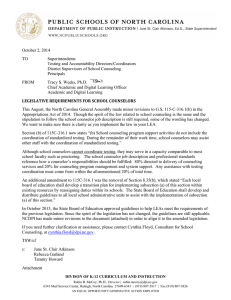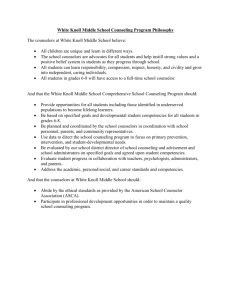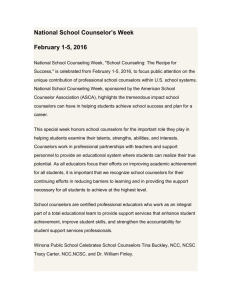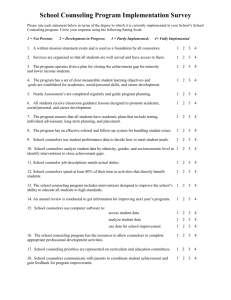The School Counselor and Student Mental Health
advertisement
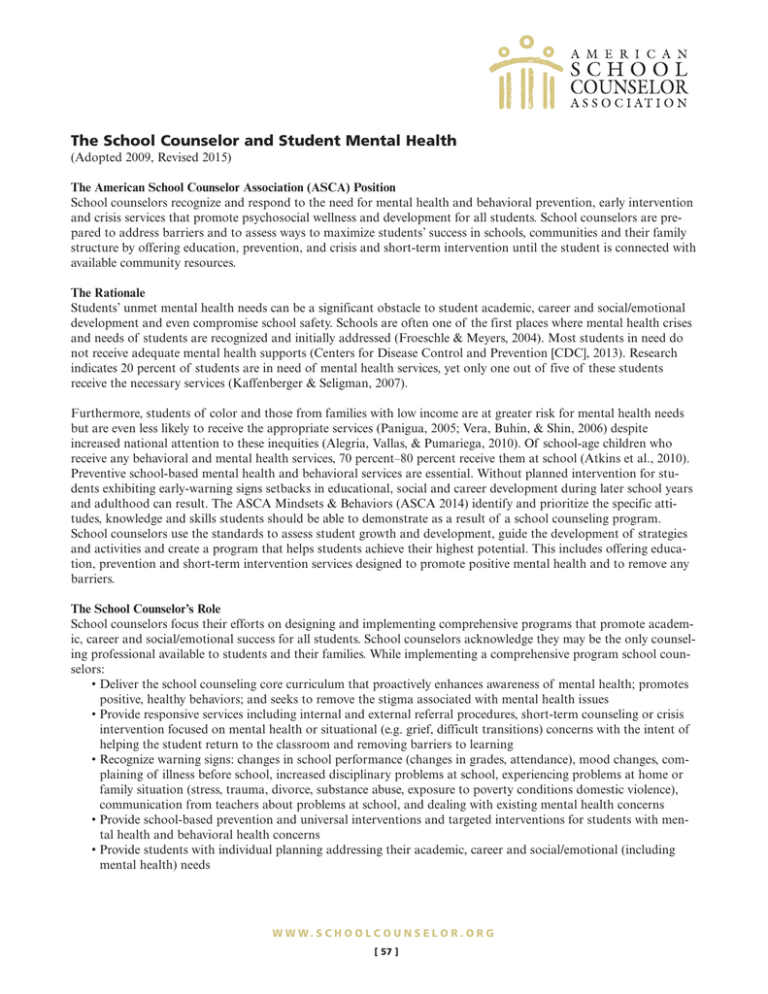
The School Counselor and Student Mental Health (Adopted 2009, Revised 2015) The American School Counselor Association (ASCA) Position School counselors recognize and respond to the need for mental health and behavioral prevention, early intervention and crisis services that promote psychosocial wellness and development for all students. School counselors are prepared to address barriers and to assess ways to maximize students’ success in schools, communities and their family structure by offering education, prevention, and crisis and short-term intervention until the student is connected with available community resources. The Rationale Students’ unmet mental health needs can be a significant obstacle to student academic, career and social/emotional development and even compromise school safety. Schools are often one of the first places where mental health crises and needs of students are recognized and initially addressed (Froeschle & Meyers, 2004). Most students in need do not receive adequate mental health supports (Centers for Disease Control and Prevention [CDC], 2013). Research indicates 20 percent of students are in need of mental health services, yet only one out of five of these students receive the necessary services (Kaffenberger & Seligman, 2007). Furthermore, students of color and those from families with low income are at greater risk for mental health needs but are even less likely to receive the appropriate services (Panigua, 2005; Vera, Buhin, & Shin, 2006) despite increased national attention to these inequities (Alegria, Vallas, & Pumariega, 2010). Of school-age children who receive any behavioral and mental health services, 70 percent–80 percent receive them at school (Atkins et al., 2010). Preventive school-based mental health and behavioral services are essential. Without planned intervention for students exhibiting early-warning signs setbacks in educational, social and career development during later school years and adulthood can result. The ASCA Mindsets & Behaviors (ASCA 2014) identify and prioritize the specific attitudes, knowledge and skills students should be able to demonstrate as a result of a school counseling program. School counselors use the standards to assess student growth and development, guide the development of strategies and activities and create a program that helps students achieve their highest potential. This includes offering education, prevention and short-term intervention services designed to promote positive mental health and to remove any barriers. The School Counselor’s Role School counselors focus their efforts on designing and implementing comprehensive programs that promote academic, career and social/emotional success for all students. School counselors acknowledge they may be the only counseling professional available to students and their families. While implementing a comprehensive program school counselors: • Deliver the school counseling core curriculum that proactively enhances awareness of mental health; promotes positive, healthy behaviors; and seeks to remove the stigma associated with mental health issues • Provide responsive services including internal and external referral procedures, short-term counseling or crisis intervention focused on mental health or situational (e.g. grief, difficult transitions) concerns with the intent of helping the student return to the classroom and removing barriers to learning • Recognize warning signs: changes in school performance (changes in grades, attendance), mood changes, complaining of illness before school, increased disciplinary problems at school, experiencing problems at home or family situation (stress, trauma, divorce, substance abuse, exposure to poverty conditions domestic violence), communication from teachers about problems at school, and dealing with existing mental health concerns • Provide school-based prevention and universal interventions and targeted interventions for students with mental health and behavioral health concerns • Provide students with individual planning addressing their academic, career and social/emotional (including mental health) needs W W W. S C H O O L C O U N S E L O R . O R G [ 57 ] • Educate teachers, administrators, parents/guardians, and community stakeholders about the mental health concerns of students, including recognition of the role environmental factors have in causing or exacerbating mental health issues and provide resources and information • Advocate, collaborate and coordinate with school and community stakeholders to ensure that students and their families have access to mental health services • Recognize and address barriers to access mental health services and the associated stigma, including cultural and linguistic impediments • Adhere to appropriate guidelines regarding confidentiality, the distinction between public and private information and consultation • Direct students and parents to school and/or community resources for additional assistance through referrals that treat mental health issues (suicidal ideation, violence, abuse and depression) • Help identify and address students’ mental health issues while working within the ASCA’s Ethical Standards; Competencies for School Counselors; and national, state and local legislation (Family Educational Rights and Privacy Act and Health Insurance Portability and Accountability Act), which guide school counselors’ informed decision-making and standardize professional practice to protect both the student and school counselor • Seek to continually update their professional knowledge regarding the students’ social/emotional needs Summary Students’ unmet mental health needs pose barriers to learning and development. Because of school counselors’ training and position, they are uniquely qualified to provide education, prevention, intervention and referral services to students and their families. Although school counselors do not provide long-term mental health therapy in schools, they provide a comprehensive school counseling program designed to meet the developmental needs of all students. As a component of this program, school counselors collaborate with other educational professionals and community service providers. References Allegria, M., Vallas, M., & Pumariega, A. J. (2010). Racial and ethnic disparities in pediatric mental health. Child and Adolescent Psychiatric Clinics of North America, 19(4), 759–774. doi:10.1016/j.chc.2010.07.001 American School Counselor Association. (2012). The ASCA National Model: A framework for school counseling programs (3rd ed.). Alexandria, VA: Author. American School Counselor Association. (2014). Mindsets & behaviors for student success: K-12 college- and careerreadiness standards for every student. Alexandria, VA: Author. Atkins, M., Hoagwood, K. E., Kutash, K., & Seidman, E. (2010). Toward the integration of education and mental health in schools. Administration and Policy in Mental Health, 37, 40–47. Centers for Disease Control and Prevention (2010). Mental health surveillance among children – United States, 2005-2011. Retrieved from http://www.cdc.gov/features/childrensmentalhealth Erford, B. T., Newsome, D. W., & Rock, E. (2007). Counseling youth at risk. In B. T. Erford (ed.) Transforming the school counseling profession (2nd ed.) (pp. 279-303). Upper Saddle River, NJ: Pearson. Erickson, A., & Abel, N. R. (2013). A high school counselor’s leadership in providing school-wide screenings for depression and enhancing suicide awareness. Professional School Counseling, 16(5), 283-289. doi: 10.5330/psc.n.2013-16.283 Froeschle, J., & Moyer, M. (2004). Just cut it out: Legal and ethical challenges in counseling students who self-mutilate. Professional School Counseling, 7, 231-235. Kaffenberger, C., & Seligman, L. (2007). Helping students with mental and emotional disorders. In B. T. Erford (ed.) Transforming the school counseling profession (2nd ed.) (pp. 351-383). Upper Saddle River, NJ: Pearson. W W W. S C H O O L C O U N S E L O R . O R G [ 58 ] Panigua, F. A. (2005). Assessing and treating culturally diverse clients: A practical guide (3rd ed.). Thousand Oaks, CA: Sage. Vera, E. M., Buhin, L., & Shin, R. Q. (2006). The pursuit of social justice and the elimination of racism. In M. G. Constantine and D. W. Sue (Eds.) Addressing racism: Facilitating cultural competence in mental health and educational settings (pp. 271-287). Hoboken: Wiley. Reback, R. (2010). Schools’ mental health services and young children’s emotions, behavior, and learning. Journal of Policy Analysis and Management, 29(4), 698-727. doi: 10.1002/pam W W W. S C H O O L C O U N S E L O R . O R G [ 59 ]


